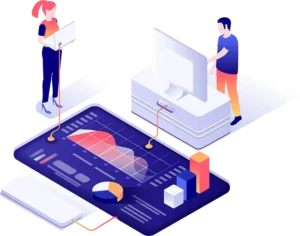A CRM (Customer Relationship Management) has become a very useful tool for companies and businesses, as it helps them improve their competitiveness and ensures an optimal level of sales. But surely you wonder “how is that possible”. Well, to clear your doubts, we have created a list of 9 benefits of a CRM for your business.
#1 Best Data Organization
A CRM helps to organize, quantify and categorize customer data with total precision, and thus have it available for the future. In addition, it allows quick access between teams, as well as easy management of all information through a shared location. This makes it possible to store a large amount of customer information from the first contact with them. And also, avoid wasting time searching files and records to find the information that is required when processing the services or products of each of them.
#2 Customer segmentation
Because CRM software allows your business to break down data by categories and criteria, the study and analysis of segmented purchase and sale data are facilitated in order to further specialize promotions and communication with customers.
By knowing who you're targeting, your business can consciously tailor your offer and tactics.
#3 Access to information in real-time
Thanks to CRM systems, business workers have instant and real-time access to centralized customer data and information, gaining access to email history, calls, price information, contracts, and more, from anywhere and anytime. device.
#4 Better communication and collaboration of the work team
A CRM serves as a record of conversations, interactions, needs, notes, and information about customers. And being connected through the cloud, you are always up to date. Therefore, the entire work team can easily view the records to make decisions or deal effectively with business customers.
Additionally, some CRM platforms have built-in collaboration tools so multiple people can work on a file at the same time or track the progress of the file.
#5 Create sales reports
CRMs enable the collection and organization of data about leads and deals using reporting features such as sales dashboards. In addition, they can evaluate the personal performance of clients and track their goals.
#6 Improve marketing strategies
CRM systems facilitate decision-making and enable members of a business's marketing team to design more defined and segmented campaigns. This is possible since there is wide and varied information on user behavior.
#7 Automate sales performance forecasting
Thanks to the reports that a CRM provides, you can obtain key data such as monthly recurring revenue (MRR) and year-over-year growth (YOY). These make it easy to identify trends and develop forecasts related to the performance of a business or company.
In addition, CRMs allow you to see which activities and sources are the most profitable. Therefore, this data helps create sales projections and make some adjustments based on the forecast estimates in order to offer a better service.
#8 Make your customers loyal
One of the main benefits of using a CRM is to improve customer satisfaction, and with it, gain their loyalty. Thanks to this you will be able to establish direct relationships with customers through the interaction of the company through different communication channels.
As all customer information is stored in the CRM, the entire work team can know what their needs and preferences are when purchasing a product or service. In this way, all transactions, marketing, and sale of products and services to customers can be carried out in an organized and systematic manner, achieving their satisfaction when using or acquiring a service or product.
#9 Automates processes and saves you time
Thanks to the introduction of a CRM system, manual activities such as creating reports and contact segmentation, customer research to identify common purchasing patterns, discovering which products are suitable for each customer, sending an email to each department to indicate pending tasks, and updating each customer with the status of their order, can now be done automatically.
This means significant time savings to focus on solving customer problems and needs.


